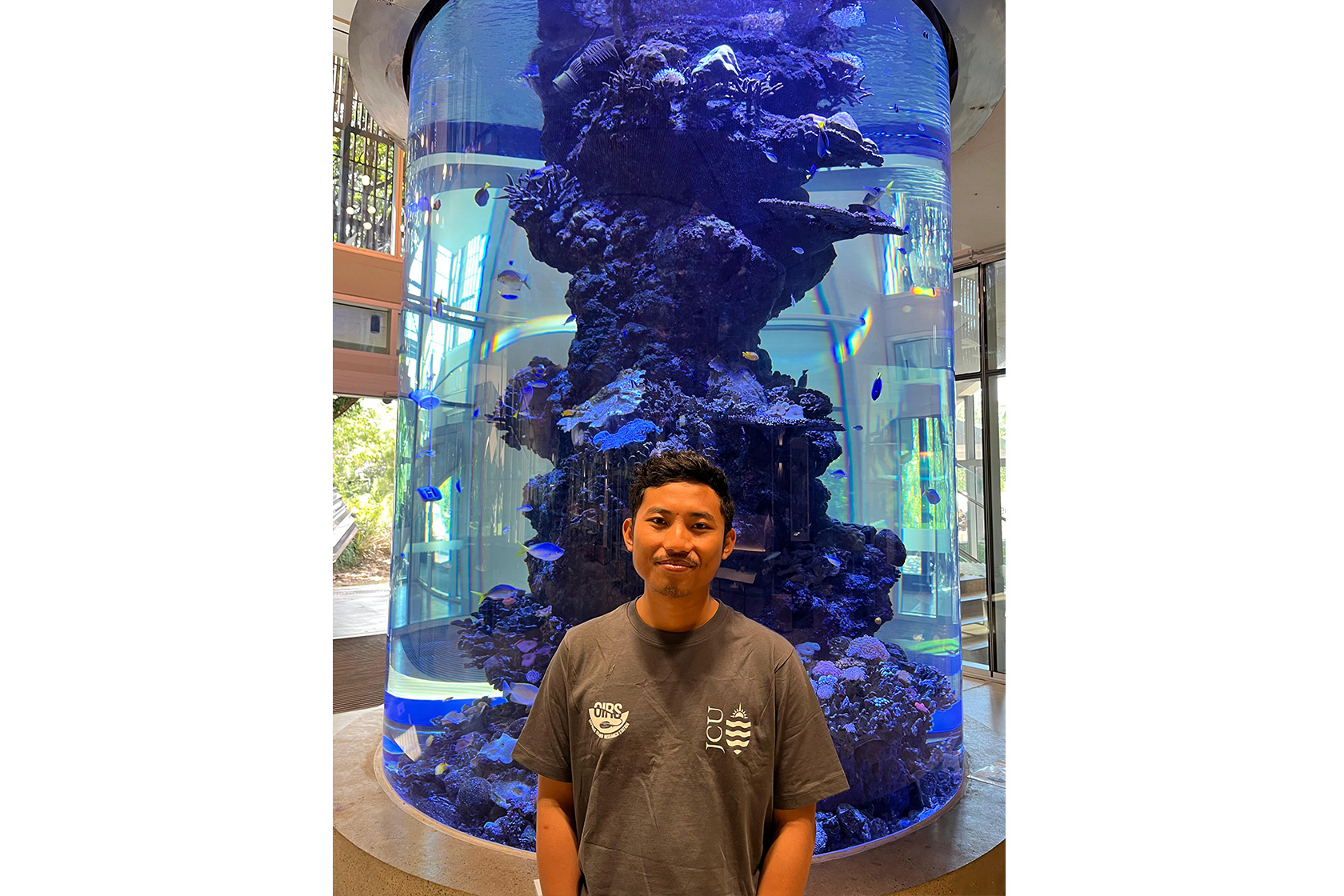
19 Mei 2025
Marroli Jeni Indarto: Memerangi Disinformasi dan Hoaks untuk Memperkuat Kepercayaan Publik terhadap Pemerintah
As an official at the Ministry of Communication and Digital (Komdigi), Marroli Jeni Indarto works to... Baca selengkapnya
Australia Awards adalah beasiswa dan studi singkat bergengsi yang bersifat transformatif, diberikan kepada para pemimpin masa depan untuk menempuh studi, penelitian, dan pengembangan profesional di Australia

02 Juni 2025
 Agus Rahman Abas Pemetaan Terumbu Karang untuk Meningkatkan Konservasi
Agus Rahman Abas Pemetaan Terumbu Karang untuk Meningkatkan Konservasi
Australia Awards scholar Agus Rahman Abas understands that protecting coral reefs does not only support the ecosystem underwater, but also the communities that depend on healthy waters for their livelihoods.
His decision to study a Masters of Marine Biology at James Cook University in Townsville was influenced by his upbringing in Gorontalo, northern Sulawesi. As he grew up, he witnessed how it was becoming harder for his father to make a decent income as a fisherman.
Agus soon became aware that environmental contamination was having an impact on marine life.
‘Working as a fisherman, my father was able to send his children to school. At first, I wanted to be like my father,’ he said. ‘But over time, my father said that there were fewer fish, and the sea was also getting dirtier. The impact of the damaged sea affected our family.’
The course at James Cook University, on the doorstep of the Great Barrier Reef, was a unique and fitting opportunity.
‘The Great Barrier Reef is the largest coral reef system in the world. It is a privilege for those who study in Australia to be able to study right there,’ Agus said. ‘In addition, the marine environment in Australia is not too different from that in Indonesia. So, the systems implemented in Australia are at least applicable in Indonesia.’
His time as an undergraduate biology student at Universitas Hasanuddin, Makassar, was another factor in his interest in marine conservation. Agus not only focused on his academic work, but was active in campus diving clubs. This led him to other research initiatives that broadened his knowledge of coral reefs and their relevance to marine conservation.
‘Increasingly, I came to understand that coral reef damage was one of the causes of the decline in fishermen's income,’ he recalled.
Diving into Coral Reef Research
In 2020, Agus was invited by a lecturer to participate in a coral reef monitoring program in Pomalaa, Southeast Sulawesi. He was tasked with studying a site for an extractives company that was investigating the impact of its operations on the reef.
Later, after graduating from college in 2022, he worked as a marine ecology surveyor for conservation group Fauna & Flora. It was conducting an ecological assessment of coral reefs and seagrass coverage in the Kapoposang Marine Protected Area and Podang Podang Island in South Sulawesi. It also provided ecological data to support a turtle and dugong conservation project in the Spermonde Archipelago.
Furthermore, he contributed as a fieldwork assistant on research organisation 4DReef’s projects in the Spermonde Archipelago. In this role he also retrieved systems called ARMS (Autonomous Reef Matrix Structures) which are artificial ‘mini reefs’ placed on the sea floor to assess marine biodiversity. He also operated a hyperspectral underwater camera used for coral reef habitat mapping in Spermonde.
Using Mapping Technology for Conservation
Agus is now doing further exploration into coral reef habitat mapping. His master's thesis is focused on mapping habitats using remote sensing technology. Having accurate maps will allow for better monitoring of reef health, identification of vulnerable areas, and help to build targeted conservation strategies.
‘I want to conserve not only species, but habitats. With this remote sensing method and the coral reef science that is being examined, I hope it will lead to breakthroughs,’ Agus said.
Recently, Agus took part in a research project on Orpheus Island, in the Great Barrier Reef, that could potentially aid his thesis. The shape of the island, he said, could shift with the seasons and the wind. Due to the reactions caused by sediment movement, the island could even appear to move at times. These changes had the potential to impact conservation management.
‘With the remote sensing technology that I am researching, more data can be taken from this island so that we can map how its shape changes, how sediment moves, what the impacts are, and how proper conservation management can be carried out there,’ he explained.
In Indonesia, the technology could be game-changing for conservation projects on small islands, for example in the area of turtle conservation.
‘In certain seasons, a location may be safe for turtle eggs. But it turns out that in other seasons, the place becomes too concave, which is not suitable for turtles to lay their eggs. Through mapping, this issue can be overcome,’ Agus said.
Agus hopes he can transfer his knowledge to benefit conservation programs on small islands in Indonesia, like those in the Spermonde Archipelago, and organisations like Tamang Dugong, which works to protect the vulnerable dugong species.
Reflecting on World Ocean Day, Agus said he hoped Indonesia could establish an institution similar to the Australian Institute of Marine Science, which is a world leader in long-term, comprehensive monitoring of coral reefs. Agus said an effective management system could only be established after understanding the current trajectory of coral reef health.
‘Coral reefs are not only beautiful, but also home to many fish populations and marine species,’ he said. ‘Coral reef damage can result in reduced fish and can endanger other marine animal populations.’
Bagikan berita ini di:
 Berita Terkait
Berita TerkaitSitus web ini menggunakan cookie untuk meningkatkan pengalaman Anda menggunakan situs web. Kami juga dapat menggunakan cookie untuk menganalisis data situs web sehingga kami dapat meningkatkan layanan online kami. Untuk mengetahui lebih lanjut, kunjungi kebijakan privasi.
